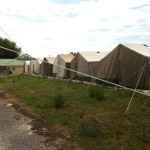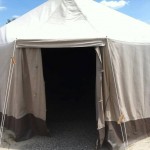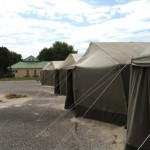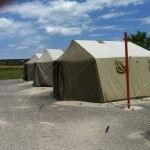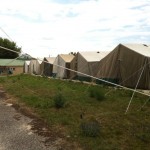Magyarországon a 2013-as év első felében a menedékjog iránti kérelmek száma megötszöröződött. A menedékkérők háromnegyede elhagyja az országot Nyugat-Európa irányába, hiszen tisztában vannak az integráció nehézségeivel, a korlátozott jogi segítség lehetőségével és azzal, hogy a fellebbezési idő nálunk a legrövidebb Európában. Ennek ellenére a magyar menekültügyi rendszer az összeomlás szélén áll. A Bevándorlási és Állampolgársági Hivatal erre, egy új befogadó állomás megnyitásával reagál, méghozzá Vámosszabadiban, a szlovák határnál fekvő faluban.
Az elmúlt hónapban, a falu lakói több heves tüntetést szerveztek a tábor megnyitása ellen, és az ügynek a média is sok figyelmet szentelt. A Migráns Szolidaritás Csoport egyetért a falu vezetősége által felhozott érvek néhány aspektusával. Például a falut hivatalosan nem tájékoztatták a tábor megnyitásáról, csak a médián keresztül értesülhettek róla. Nem kaptak tájékoztatást a menedékkérők magyarországi jogairól, kötelességeiről sem.
Szeretnénk felhívni a Bevándorlási és Állampolgársági Hivatal és a Belügyminisztérium figyelmét, hogy az információ és a kommunikáció hiányának köszönhető, hogy Vámosszabadi a xenofóbia táptalajává vált. Ennek köszönhető, hogy a helyi lakosokban felgyűlt az indulat, amely létrehozta ezt az idegenellenes légkört. Vámosszabadi polgárai azzal vádolják a Kormányt, hogy a legminimálisabb költségvetésből próbálja megoldani a menekültügyi helyzetet. A Migráns Szolidaritás Csoport egyetért ezzel az állítással, hiszen elképesztő módon az összes menekülteket és menedékkérőket ellátó intézmény a városok, falvak határaiban helyezkedik el, ami igencsak megnehezíti a magyar lakossággal való kapcsolattartást, nyelvtanulást. A befogadó állomások elhelyezkedése jól tükrözi a menekültek marginalizált helyzetét Magyarországon. Gondoljunk csak bele, hány üresen álló, kihasználatlan épület van jelenleg is Budapesten! Nehéz megérteni, hogy a Bevándorlási és Állampolgársági Hivatal miért csak az elhagyatott katonai laktanyákat veszi számításba, miért kell egy befogadó állomást a szlovákiai határ mellé helyezni! Véleményünk szerint, a nagyméretű menekülttáborok nem szolgálnak megfelelő lakhatásként sem a menedékkérők sem a menekültek számára. A városokon belül elhelyezett kisebb lakóépületek, privát szállások sokkal inkább elősegítenék a magyar társadalomba való integrációt.
A Migráns Szolidaritás Csoport aggodalommal figyeli a Vámosszabadiban uralkodó agresszív és szélsőségesen idegengyűlölő légkört, és a menedékkérőkről terjedő téves elképzeléseket. Értjük a lakosok félelmeinek alapot adó aggodalmakat, ám a menedékkérők idegengyűlölő megbélyegzésével nem értünk egyet. Arra biztatjuk honfitársainkat, hogy emlékezzenek az ötven évvel ezelőtti időszakra, amikor magyarok ezrei szintén menedéket kerestek más országokban, és tisztességes eljárásban, meleg fogadtatásban volt részük.
Legelsősorban pedig követeljük a Bevándorlási és Állampolgársági Hivataltól, hogy kezdeményezzen részletekbe menő párbeszédet, egyeztetéseket a menekültügy területén bevezetendő változásokról az összes érintett szereplővel. Követeljük továbbá, hogy az ország összes menekültügyet érintő döntését nyíltan, mindenki által megismerhető módon hozzák meg. Nyilvánvaló, hogy a Vámosszabadin lévő tüntetések – látván, hogy bírálatuk milyen nagy mértékben a Fidesz-KDNP-kormány, a Bevándorlási és Állampolgársági Hivatal és a Belügyminisztérium ellen irányulnak – a magyarországi politikáról szólnak. Végeredményben arra kérjük Vámosszabadi lakóit, hogy ne az egyes menedékkérőket hibáztassák, és ne rajtuk vezessék le a Kormány és a Belügyminisztérium rossz döntéseit, hanem nyíltan és kíváncsian fogadják őket.
The first half of 2013 has seen a five-fold increase in the number of asylum applications in Hungary. Knowing the difficulties of integration, limited legal aid and appeal time among the shortest in Europe, three quarters of the asylum seekers have left hungary towards Western Europe. Nevertheless, the Hungarian asylum system is on the brink of the collapse, and the Office of Immigration and Nationality (OIN) has responded by opening a new reception centre in the village of Vámosszabadi on the Slovakian border.
In the past month, the villagers have organized several fierce demonstrations against the camp, and the situation has gained a lot of attention in the media lately. Migráns Szolidaritás Csoport (Migrant Solidarity Group of Hungary) actually agrees with some aspects of the arguments made by village leaders. For example, the village was not officially informed prior to the opening of the camp, and only learned about it in the media. No information was provided regarding the rights of asylum seekers and their responsibilities while in Hungary.
We would like to remind OIN and the Ministry of the Interior that a lack of information, transparency, communication with the residents of Vámosszabadi has created a fertile ground for xenophobia, and has stoked a tense and xenophobic atmosphere. The villagers of Vámosszabadi accuse the Hungarian government of wanting to deal with refugees as cheaply as possible. Migráns Szolidaritás agrees with this statement, noting with amazement that all the current facilities for refugees and asylum seekers in Hungary are situated in outskirts of towns and villages — making personal contact with Hungarians and language learning difficult.The location of refugee camps in Hungary only contributes to a popular misconception of refugees as a marginal group of people. Considering that today there are thousands of vacant buildings in Budapest, we do not understand why OIN has only considered abandoned military barracks as a locations, and why the new reception center needs to be placed on the Slovakian border. According to our opinion, big reception centres are not adequate housing solutions for either asylum-seekers or for refugees but smaller hostels/private accommodation in cities and towns would help their integration into Hungarian society.
That said, Migráns Szolidaritás is alarmed at the aggressive and extremely xenophobic atmosphere in Vámosszabadi, and the spreading rumors of asylum seekers. While we understand the underlying concerns of the villagers, we do not agree with the xenophobic labeling of asylum seekers in the village. We urge Hungarians to remember that 50 years ago hundreds of thousands Hungarians also sought asylum in other countries, and were often granted fair procedures and a warm receptions.
Crucially, we demand the OIN to adopt a policy of in-depth communication and consultation with all stakeholders as a prerequisite for the introduction of changes in the asylum policies, as well as transparent decision-making regarding all asylum matters in the country. Finally, we see that with much justified critique to Fidesz-KDNP, OIN and the Ministry of the Interior, the protests in Vámosszabadi are much about Hungarian politics. We finally urge the villagers in Vámosszabadi not to make individual asylum seekers pay for the mistakes of the Hungarian Government and Ministry of the Interior, and welcome them with openness and curiosity.
